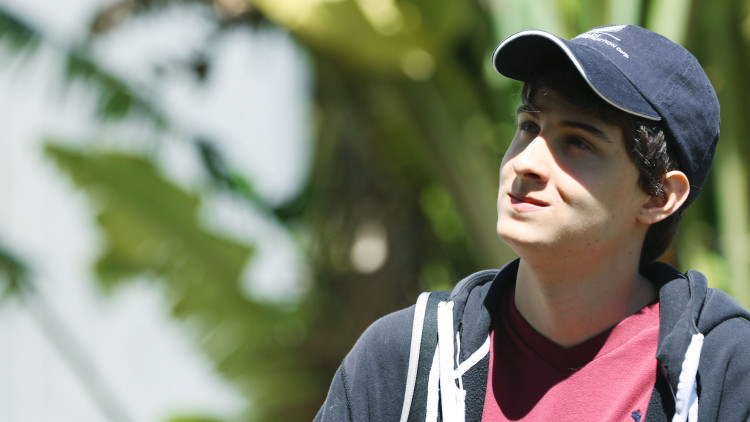This article was originally published by The Reporter.
By Adriana Falero
Looking in the mirror one weekend, about two and a half years ago, Sterling Velazquez noticed something different about his face.
It wasn’t the typical acne or early stages of a beard most teenagers see when looking in the mirror. His face was swelling. He thought it might have been a side effect of a medication, but wasn’t quite sure. As it progressively became more noticeable, classmates started questioning if something was wrong.
But he didn’t know how to answer.
A week later, after a battery of tests, he discovered shocking news. His facial swelling was something serious and life threatening—a symptom of Non-Hodgkin lymphoma in its fourth stage. Non-Hodgkin lymphoma is a form of cancer that originates in white blood cells called lymphocytes, according to the American Cancer Society. At that stage, it can be fatal. The only way to treat it is with intensive chemotherapy regimens.
That’s something Velazquez has been dealing with ever since. Despite the diagnosis, Velazquez, who is now 18, has a rigorous schedule in his senior year of high school at the School for Advanced Studies (SAS) at Kendall Campus. He lives with the side effects of acute lymphoblastic lymphoma, a cancer of the bone marrow and blood.
“I wasn’t going to get sidetracked by anything, especially cancer.”
Although he says it has been a challenge to be enrolled in such demanding studies while battling cancer, his illness hasn’t acted as an excuse for him to succeed academically.
“My education has given me many choices for my future,” Velazquez said. “I wasn’t going to get sidetracked by anything, especially cancer.”
Velazquez knew he wanted to become part of Miami Dade College’s School for Advanced Studies (SAS) as early as elementary school. He heard about it through one of his teachers at Coral Park Elementary. At a time when most children only worry about games or what their next meal is going to be, Velazquez was already thinking about enrolling in SAS. The high school offers a demanding curriculum of Advanced Placement (AP) and dual enrollment courses. SAS students graduate with an AA degree from MDC prior to receiving their high school diplomas.
It was also during his elementary school years when Velazquez first experienced a pain in his chest. The pain became persistent and turned out to be one of the early symptoms of his illness. But it wasn’t until tenth grade, when his face started swelling, that he was diagnosed.
“For me it was more of just a shock and I wasn’t depressed about it or anything,” Velazquez said. “I just didn’t know what to do.”
Velazquez woke up one day and decided he wasn’t going to just linger in a hospital bed. His mother brought a keyboard and he started playing piano, a musical talent he has had since second grade. He also signed up for online classes and took AP calculus AB, a highly demanding course. He earned an A in the class by teaching himself.
The first year after his diagnosis, Velazquez had to visit the hospital every other day. At times, he would be so sick that he had to stay for weeks.
“He has persevered and even on days when I know he’s tired, he shows up.”
His hospital visits led to frequent school absences during his junior year at SAS. His teachers have been understanding and made the process easier for Velazquez. One of these supportive teachers is Lynn Beam, an AP English teacher at SAS, who describes Sterling as a brilliant, tenacious student.
“He has persevered and even on days when I know he’s tired, he shows up,” Beam said. “He’s also lost a lot of days. But it’s not that he’s staying home because he doesn’t want to get out of bed. He stays home because he can’t operate. That’s a whole different thing.”
Velazquez has always been motivated to be the best student he can be in every subject. He characterizes himself as hardworking and a perfectionist, someone determined to finish whatever he starts. His impressive 5.08 grade point average is a result of his remarkable intelligence and efforts.
As of now, computer science and engineering is the career path Velazquez has decided to take. He spends some of his spare time playing video games and, based on his inclination for game development, plans to use computer programming to work for major gaming companies like Valve, Bungie, Activision or Treyarch.
Velazquez also spends part of his free time playing piano. After his diagnosis, he had to discontinue his piano lessons and his piano skills have been self-taught ever since.
His illness has limited him in other areas. He must avoid sun exposure and therefore can’t go out as often as he used to, especially to places like the beach. Because of his weakened legs, he has been using crutches and can’t play sports. He attends physical therapy twice per week, mainly performing basic leg exercises, stretches, and aerobic exercises like bicycling.
“I try to make him have a regular life,” Velazquez’s mother said. “I encourage him to do things that even if he can barely do them, he does them anyway. His progress has been excellent. He has recovered very well.”
“You can’t ever say that you’re going to stop.”
As far as plans for the future, he hopes to earn acceptance into an Ivy League institution such as Harvard or Princeton University.
“I’ve learned that if you stop moving, you’re going to fall apart,” Velazquez said. “If I had focused on all the constant problems that were popping up literally every day, I don’t think I would have made it. At least not with my mind intact. You can’t ever say that you’re going to stop. If you push harder now, you’re going to thank yourself in the end, and if you don’t, you’re going to regret it later.”
VIDEO: NBC 6 COVER’S STERLING’S STORY
